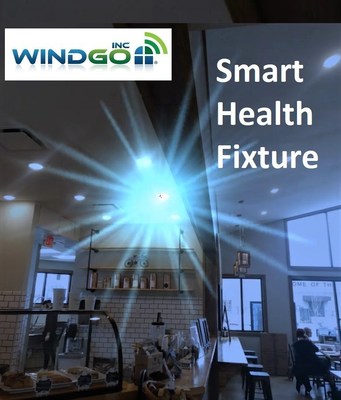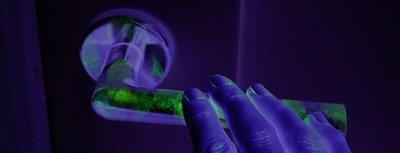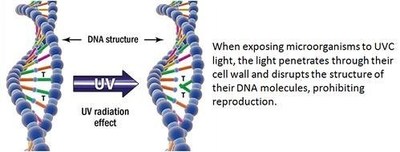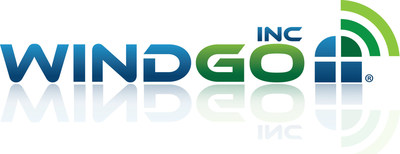WINDGO Smart Health Fixtures can safely kill up to 90% of viruses with sensor-verified networked ultraviolet light projection

COLUMBIA, Mo., March 18, 2020 /PRNewswire/ — WINDGO, Inc., a research and development company specializing in smart material and vibrational transfer technologies, announced today that they have developed a networked sensor-verified light projection fixture that allows scheduled exposure of programmable light wavelengths. Fixture projection modes include visible Red-Green-Blue(RGB) with dynamic color-temperatures and safe sterilization modes that selectively expose air and surfaces to visible, UV-C and far-UVC wavelengths of light. WINDGO has developed an advanced sterilization solution utilizing multiple granted and pending US patents. The smart health fixture system provides smart sensors and network communicating projectors that can safely attack the physical structure of biological material such as viruses.
A virus is a microorganism that reproduces itself within a host body. When a microorganism is exposed to UV-C light, the projected light wave penetrates through the organism’s cell wall and disrupts the structure of its DNA molecules. The net result is that the virus can no longer reproduce itself due to its permanently damaged DNA.
Each smart health fixture is setup with an exposure time using special lighting wavelengths. The IoT projection profile is programmed for each sensory projection fixture to provide safe surface exposures to environmental surfaces such as bathrooms, hallways, doorknobs, kitchens, automobiles, planes, buses and other private and public areas. These networks can be easily integrated to enhance existing security systems that utilize motion detection technology. Our goal is to provide safe, scalable and affordable smart health fixtures that can be mass produced rapidly.
UV-C is a special lighting wavelength that is beyond the traditional UV-A and UV-B ranges that are often associated with typical outdoor sunlight exposure, tanning beds, black lights and other general ultraviolet light waves.
Microorganisms can live on surfaces for many minutes, hours or in some cases for days. By exposing nearby air and surfaces to selected wavelengths of light the surfaces can become less harmful to humans. The overall goal is to achieve a reset or baseline-zero of infectious disease management.
Cellular phones can contain a buildup of organisms that can become a petri dish of growth for up to four days. If the contamination buildup on surfaces could be managed periodically to a baseline of zero we could experience a net decrease of exposure to many diseases. Hospitals are a perfect example of locations that could benefit from minimizing the buildup of continuous microorganisms. The overall goal of this technology would ultimately provide airborne, surface and human skin contact neutralization and microorganism sterilization.
According to David J. Brenner, PhD, professor and director of the Center for Radiological Research at Columbia University Medical Center, and colleagues, a narrow spectrum of ultraviolet C light called far-UVC can safely prevent the spread of diseases like influenza and tuberculosis that can be transmitted through the air.* Research in the areas of far-UVC wavelengths are showing promise for safe human exposure in specific wavelengths such as 222nm. This could lead to safe, low-level, long-term human exposure to this unique light waves to reduce microorganisms on the skin surface.
*Ref: https://www.nature.com/articles/s41598-018-21058-w
The future will likely bring many opportunities for far-UVC and selective UV-C lighting as a direct human projection sterilization solution. Today’s traditional UV-C lighting solutions can project directly into the air and onto surfaces within buildings provided there are no humans in the immediate area during projection. UV-C is different from far-UVC as far-UVC is a special wavelength of light that has been shown to not propagate beyond surface skin layers in humans. Unmanaged propagation of raw UV-C light is a natural irritant to human skin and is specifically harmful to the human eyes. Therefore, it is important that a smart and safe system is put in place to verify that no humans are present during active UV-C light projection. WINDGO is currently working to ensure that humans are not exposed to direct light projection of UV-C wavelengths by utilizing a network of local and remote sensors and scheduling. The smart health fixture’s sensor array ensures that the projection environment is void of human presence, providing pre-authorized wavelength settings and sensor-verified profiles of lighting projection to airborne viruses and nearby surfaces. Surfaces can become sterilized in a few minutes and local airborne organisms can be killed in a few seconds.
“Airborne and surface microorganisms can be minimized up to 90% by utilizing our Smart Health Projection Fixtures,” says VP of R&D, David Strumpf. “It is very important that we schedule, sense and manage the sterilization projection areas to ensure that proper exposures are maintained. For example, it is critical that the fixture sensory array adapts to human movement to ensure that no harmful radiation is present while humans are in the room. By utilizing the latest technology in low-cost mm-wave radar detection sensors along with IoT networked data-analytics our health fixtures can instantly reconfigure light wave projection mapping as humans move throughout the building. Multiple health fixtures work together as a living network to ensure maximized sterilization while protecting humans as they freely move about. These efforts and actions will allow low-cost scalable deployments that can help save lives in the near-term. Our goal is to raise short-term funding to place these smart health fixtures in public areas such as schools, airports, libraries, public transportation and elderly facilities.”
This new technology is in line with WINDGO’s emphasis on energy, resonance and vibration technologies and products. WINDGO, Inc. is focused on the IoT End-Node market expansion that is forecasted to exceed one trillion dollars by 2025. This new invention is based on technologies that evolved from the original works of inventor Fielding Staton. His invention of the Absorbud in 2013 has led to industry changing advancements in macro, micro, and nano-based technologies.
WINDGO/Newtonoid PDF US Patents Public Press Copy- Freely Distributed and found on the WINDGO website.
Inventors: Fielding Staton – Liberty, MO and David Strumpf – Columbia, MO
About WINDGO, Inc
WINDGO, Inc. is a privately-held company based in Columbia, MO. WINDGO, Inc. has numerous patent holdings within its Intellectual Property holding company – Newtonoid, LLC which has been in the research and development business since 2013. Founded in 2016, WINDGO, Inc. has researched, developed, and produced a variety of smart products and other intelligent product subsystems in the sensory and digital markets including Absorbud, Smart Windows, Intelligent Glass Displays, Responsive Biomedical Implants, Robot Skin Membranes, the ProVector™ Measurement Projection Mapping System, the Drone Roof Chute™ Systems & Methods for Receiving Packages Delivered by Unmanned Vehicles, the Food Puck™ Assistive Cooking Device and Sensory System, the Shingle Roof Clip System and many other patents with cross-industry applications.
View original content to download multimedia:http://www.prnewswire.com/news-releases/windgo-smart-health-fixtures-can-safely-kill-up-to-90-of-viruses-with-sensor-verified-networked-ultraviolet-light-projection-301025899.html
SOURCE WINDGO, Inc.



